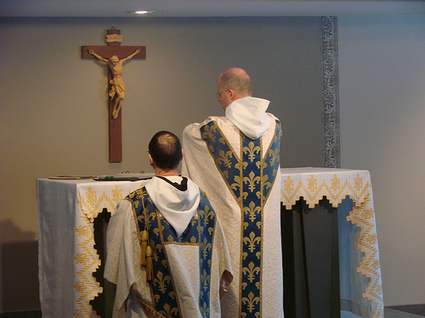 That would be the back of the priest, actually.
That would be the back of the priest, actually.
Fr. Richard Simon writes of his experience recently saying mass “ad orientem,” facing away from the congregation for a small portion of of the liturgy. The reaction from the people in the pews wasn’t entirely warm:
Some people loved it, most didn’t like it, some were infuriated. In particular I got angry fingers in the face, from someone who said that “the Pope had sent a letter to all priests telling them that they had to face the people.” How do you prove something that never happened? Rome has never said anything about having to face the people during Mass. One must do so only six times. It is one of the great mysteries of our times why, overnight, most of the altars in Catholic Churches were turned around.
And he adds:
I, however, wish I had not said Mass facing away from the congregation, and not because of the anger directed at me. I am a Catholic priest. I am used to people being angry with me. I wish I had not said Mass in what I believe to be the posture assumed by the Fathers of the Second Vatican Council, because it was one of the most beautiful experiences of my priestly life. You cannot imagine what it was like to say words like “we” and “our Father” and “us” while standing at the head of a congregation that was turned together in a physical expression of unity. No matter how one might argue to the contrary, it is impossible to say “we” while looking at 500 people and not be speaking to them.
The Mass is a prayer addressed to the Father, and despite our best intentions, we clergy address it to the congregation at whom we are looking. You cannot help it. The human face is a powerful thing. Last Saturday night I realized for the first time that I was part of a family of faith directed toward the same heavenly Father. I felt as if I was part of a church at prayer. It was not my job. It was my church. I never realized how very lonely it is to say Mass facing the people. I am up there looking at you. I am not part of you. For 13 or 14 minutes. You weren’t looking at me. We were looking at God.
He concludes by noting he’s not planning to make this a regular custom:
I know that most people in my congregation would be offended if I started to face the altar regularly, because they are unaccustomed to it. I would be accused of factionalism or some such crime, so I don’t think that the market will bear it, but from now on every time I say Mass staring at the congregation and they hear Mass staring at my ugly mug, I will remember what could, what should have been. I fear I am as much a performer as a priest. I want to be a priest, but the show must go on.
Read the whole thing. Much valuable food for thought here.

